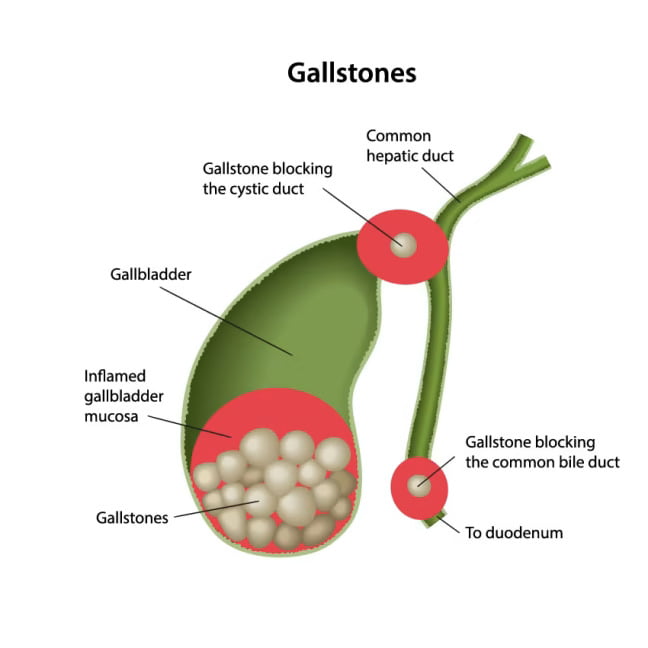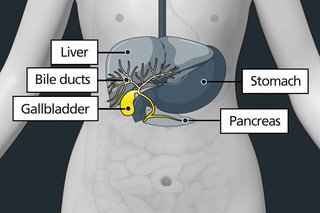How Gallstones Trigger Pancreatic Inflammation in Type 3c Diabetes?
- admin
- November 6, 2024
- 9:12 pm
- No Comments

Gallstones, those tiny stones formed in the gallbladder, can unexpectedly wreak havoc on more than just digestive health.
In this article, BestDietarySupplementforDiabetics is exploring how gallstones can lead to pancreatic inflammation, sometimes resulting in Type 3c diabetes, a form of diabetes tied directly to pancreatic conditions.
What to Expect in This Article?
In this comprehensive guide, we’ll discuss:
- What gallstones are and how they form
- The connection between gallstones and pancreatic inflammation
- How inflammation caused by gallstones can damage pancreatic cells
- Why this leads to Type 3c diabetes
- FAQs on How Gallstones Lead to Inflammation in Type 3c Diabetes
- Real-life examples to illustrate how gallstones affect pancreatic health
So, let’s dive in and see how these small stones can lead to a big impact on pancreatic function and blood sugar regulation.
What Are Gallstones and How Do They Form?
Gallstones are small, hardened deposits that form in the gallbladder, typically made up of cholesterol or bilirubin.
While these stones might remain harmless for some people, they can cause significant health issues when they migrate or block bile flow.
How Gallstones Form?
When the balance of substances like cholesterol, bile salts, and bilirubin is off in the gallbladder, it can result in the formation of these stones.
Many factors influence gallstone formation, including obesity, high cholesterol diets, genetic mutations, and certain medications.
According to research in the Journal of Gastroenterology, hormonal imbalances can also increase the risk, particularly in women.
The Gallbladder and Pancreas: A Complicated Relationship
Though separate organs, the gallbladder and pancreas share a common pathway.
When bile or pancreatic fluid cannot flow freely, it can back up and lead to inflammation.
This close anatomical relationship means that issues in the gallbladder often directly impact the pancreas.
Example:
Consider Emily, a 52-year-old who developed gallstones after years of high-cholesterol diets and infrequent exercise.
One gallstone eventually blocked her bile duct, leading to an unexpected inflammation of her pancreas—a condition called pancreatitis.
Emily’s doctors explained that her pancreas was under stress, making it harder to produce insulin.
Key Insight:
Pancreatitis, often linked with gallstone obstruction, can lead to Type 3c diabetes, which differs from Type 1 and Type 2 diabetes as it is triggered by pancreatic damage.
How Gallstones Lead to Pancreatic Inflammation?
Gallstones can obstruct the pancreatic duct, leading to what is known as “biliary pancreatitis.”
This blockage stops pancreatic enzymes from flowing normally, and as a result, these enzymes begin to digest pancreatic tissue, causing inflammation.
Scientific Perspective on Biliary Pancreatitis
Studies such as those in the American Journal of Gastroenterology reveal that gallstones can initiate pancreatic damage by blocking the main pancreatic duct.
The duct blockage increases the pressure, leading to the release of digestive enzymes within the pancreas itself—essentially causing the pancreas to “digest” its own tissue.
Hormonal Impact:
This inflammation can trigger hormone disruptions within the pancreas, especially affecting insulin production, which we will discuss shortly.
How Pancreatic Inflammation Affects Insulin Production?
When gallstones trigger pancreatic inflammation, the pancreas’ ability to produce insulin is compromised.
Insulin, a hormone essential for regulating blood sugar, is produced by specialized cells in the pancreas.
Inflammation can disrupt or even destroy these cells, affecting blood sugar control.
According to a study published in Endocrine Reviews, chronic pancreatitis frequently leads to “Type 3c diabetes,” a diabetes subtype directly associated with pancreatic injury.
Here is how:
- Damage to Beta Cells: Inflammation from pancreatitis impairs insulin-producing beta cells, reducing insulin production.
- Scarring and Fibrosis: Chronic inflammation leads to fibrosis or scarring, permanently damaging pancreatic tissue.
- Hormone Imbalance: Inflammation also disrupts other pancreatic hormones, such as glucagon, making blood sugar regulation even harder.
Real-Life Example:
James, a 45-year-old accountant, struggled with recurring pancreatitis due to gallstones.
After multiple episodes, his doctor noted that James’ blood sugar levels were erratic—a clear indication that his pancreatic function was compromised.
Soon after, James was diagnosed with Type 3c diabetes, a condition rooted in his damaged pancreatic tissue.
So, he took the help of the best supplements to lower blood sugar. Luckily for James, they got the job done by stabilizing his fluctuating blood sugar levels.
>>> Want to Learn How I “Treated My Gallstones” by Controlling My “Blood Sugar Levels Naturally”??? Click Here to Find Out! <<<
Type 3c Diabetes: What Makes It Different?
Type 3c diabetes, also known as pancreatogenic diabetes, is a unique form of diabetes directly related to pancreatic disease.
Unlike Type 1 or Type 2 diabetes, Type 3c stems from pancreatic injury, often through inflammation or removal of part of the pancreas.
Key characteristics include:
- Insulin Deficiency and Glucose Intolerance: Since the pancreas is damaged, insulin production is lower, leading to higher blood sugar levels.
- Digestive Enzyme Insufficiency: Patients may experience digestive issues since the pancreas also helps digest food.
- Tied to Pancreatic Diseases: Studies show that people with pancreatitis or pancreatic injury, like that caused by gallstones, have a higher chance of developing Type 3c diabetes (Diabetes Care journal).
Why Gallstones Increase Risk for Type 3c Diabetes?
With gallstones frequently causing pancreatitis, people with gallstone issues are at a higher risk for Type 3c diabetes.
The inflammation caused by these stones leads to repeated injury to the pancreas, eventually resulting in reduced insulin-producing cells and digestive function.
Signs and Symptoms of Gallstone-Induced Pancreatic Inflammation
Recognizing the symptoms of pancreatic inflammation triggered by gallstones is essential for early intervention.
Common symptoms include:
- Abdominal Pain: Often severe and radiating to the back.
- Jaundice: Yellowing of the skin, indicating bile duct obstruction.
- Nausea and Vomiting: Common symptoms of both pancreatitis and gallstone obstruction.
- Blood Sugar Changes: High blood sugar levels or erratic blood sugar patterns, indicating a compromised pancreas.
Case Study:
Sarah, a 38-year-old mother of two, noticed a pattern of severe abdominal pain after eating fatty meals.
When she developed jaundice, she visited her doctor, who diagnosed her with gallstone-related pancreatitis.
Later, Sarah was informed that the inflammation had damaged her pancreas’ ability to produce insulin, resulting in Type 3c diabetes.

Long-Term Effects of Gallstone-Induced Pancreatic Inflammation
The long-term effects of pancreatic inflammation due to gallstones can be significant, impacting not only blood sugar but overall health:
- Increased Risk of Diabetes: Persistent inflammation damages pancreatic cells, heightening the risk for Type 3c diabetes.
- Chronic Pancreatitis: Recurrent gallstone obstructions can lead to chronic pancreatitis, a condition that is both painful and difficult to manage.
- Digestive Complications: Pancreatic enzymes are essential for digestion; without them, patients may experience malnutrition or weight loss.
Research Insight:
According to Gastroenterology and Hepatology research, chronic pancreatitis, often stemming from gallstones, not only leads to digestive issues but is a significant contributor to diabetes, particularly Type 3c diabetes.
FAQs on How Pancreatic Inflammation is Caused by Gallstones in Type 3c Diabetes
Q-1: How do tiny gallstones or “sludge” ignite pancreatic inflammation?
A-1: Microscopic stones can briefly plug the common channel where the bile and pancreatic ducts meet. That back-pressure allows bile to reflux toward the pancreatic duct and raises ductal pressure—conditions that favor premature activation of digestive enzymes inside the gland. Even a short obstruction can trigger an inflammatory cascade, explaining why attacks may start suddenly after a fatty meal and then seem to “resolve” when the stone passes.
Q-2: Why are people with (or prone to) Type 3c diabetes especially vulnerable to biliary triggers?
A-2: Prior pancreatic injury leaves less “reserve” in both exocrine tissue (enzymes, bicarbonate) and islets (insulin, glucagon). When a gallstone provokes another bout of inflammation, the blow lands on an already thinned organ. The result is a larger hit to digestion (steatorrhea, weight loss) and wider glucose swings—higher post-meal peaks and higher risk of late lows because counter-regulation is impaired.
Q-3: Can gallstones cause “micro-attacks” that fly under the radar? What clues should I watch for?
A-3: Yes. Transient blockages may produce only brief upper-abdominal pain or back discomfort, mild nausea, and short-lived appetite loss. Between episodes you might notice greasy, difficult-to-flush stools, new intolerance to fried foods, or unexplained glucose volatility (late spikes after meals, surprising morning lows). These patterns, especially in someone with known gallstones, point to biliary micro-obstruction as a repeat irritant.
Q-4: How do common treatments change the diabetes trajectory after gallstone pancreatitis?
A-4: Early removal of the gallbladder (after stabilization) and, when indicated, endoscopic stone extraction/sphincterotomy reduce re-attacks that progressively erode islet function. If exocrine insufficiency develops, properly dosed pancreatic enzymes (taken with the first bite) improve fat and starch breakdown, restore incretin signaling, and can make post-meal glucose more predictable—sometimes prompting adjustments to insulin or other therapies.
Q-5: While awaiting definitive care, what day-to-day moves lower the risk of another biliary flare?
A-5: Favor smaller, lower-fat meals to reduce forceful gallbladder contractions; stay well-hydrated; avoid crash dieting (rapid weight loss promotes gallstone formation); and keep evening meals modest. If a meal must be higher-fat, split it in two sittings hours apart. Track symptoms alongside glucose readings; sudden right-upper-quadrant pain, fever, or persistent vomiting warrants urgent evaluation to rule out duct obstruction or infection.
Takeaway: Understanding the Gallstone-Pancreas-Diabetes Connection
In summary, gallstones do far more than cause discomfort—they can obstruct the pancreatic duct, leading to pancreatitis.
This inflammation damages insulin-producing cells, resulting in Type 3c diabetes.
While lifestyle changes and medical treatments may help, understanding the risk of gallstones and their potential to lead to pancreatic inflammation and diabetes is vital.
Real-life cases like those of Emily, James, and Sarah show how gallstones, left untreated, can lead to significant and lasting damage to pancreatic function.
As research continues, the link between gallstones, pancreatic inflammation, and Type 3c diabetes grows stronger, urging individuals to recognize and address gallstone symptoms early.
References: